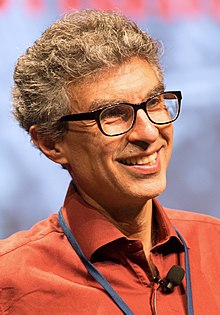Yoshua Bengio
Yoshua Bengio (born March 5, 1964 in Paris ) is a Canadian computer scientist . He became known for his research on artificial neural networks and deep learning , for which he is considered one of the pioneers with Geoffrey Hinton and Yann LeCun .
Bengio grew up in France and Montreal . He studied electrical engineering and computer science at McGill University , where he received his bachelor's degree in electrical engineering in 1986, his master's degree in computer science in 1988 and his PhD under Renato de Mori in 1991 (dissertation: Artificial Neural Networks and Their Application to Sequence Recognition ). His dissertation was on neural networks and Hidden Markov Models (HMM) used together in learning to distinguish. As a post-doctoral student he was with Michael I. Jordan at the Massachusetts Institute of Technology and at the Bell Laboratories (1992/93) in the group of Larry Jackel , Yann LeCun and Vladimir Vapnik . During this time he showed in a series of works the limits of gradient-based machine learning for parameterized dynamic systems, which also include recurrent neural networks or HMM. Since 1993 he has been a professor at the University of Montreal , where he headed the Montreal Institute for Learning Algorithms (MILA) and is co-director of the Learning in Machines & Brains project of the Canadian Institute for Advanced Research. He has also held a Canada Research Chair in statistical learning algorithms since 2000 .
In 2016 he co-founded Element AI in Montreal for applications of artificial intelligence.
He dealt with the limits of common machine learning algorithms in artificial intelligence with the aim of possibly circumventing them with new algorithms and machines. In the 1990s he presented the problems of learning how to represent context and later the limits of flat architectures and the difficult optimization and inference problems of deeper architectures of neural networks.
In 2017 he became an Officer of the Order of Canada and a Fellow of the Royal Society of Canada . He is one of the most highly cited scientists.
For 2018 he received the Turing Award with Geoffrey Hinton and Yann LeCun . In 2020 Bengio was elected to the Royal Society .
Fonts (selection)
- Léon Bottou , Patrick Haffner, Paul G. Howard, Patrice Simard, Yoshua Bengio, Yann LeCun : High Quality Document Image Compression with DjVu , In: Journal of Electronic Imaging , Volume 7, 1998, pp. 410-425 doi : 10.1117 / 1.482609
- Y. Bengio, Dong-Hyun Lee, Jorg Bornschein, Thomas Mesnard, Zhouhan Lin: Towards Biologically Plausible Deep Learning , arXiv.org, 2016
- with Y. LeCun, L. Bottou, P. Haffner: Gradient-based learning applied to document recognition , Proc. IEEE, Vol. 86, 1998, pp. 2278-2324
- Yoshua Bengio, Dale Schuurmans, John Lafferty, Chris K. Williams, Chris, Aron Culotta (Eds.), Advances in Neural Information Processing Systems 22 (NIPS'22), December 7th – 10th, 2009, Vancouver, BC , Neural Information Processing Systems (NIPS) Foundation, 2009
- Learning deep architectures in AI, in: Foundations and trends, Machine Learning, Volume 2, 2009, pp. 1–127
- with Y. LeCun, G. Hinton: Deep learning , Nature, Volume 521, 2015, p. 436
- Dzmitry Bahdanau, Kyunghyun Cho, Yoshua Bengio: Neural Machine Translation by Jointly Learning to Align and Translate , ICLR 2015, Arxiv
- Ian Goodfellow, Yoshua Bengio and Aaron Courville: Deep Learning (Adaptive Computation and Machine Learning) , MIT Press, Cambridge (USA), 2016. ISBN 978-0262035613 .
- Neural Net Language Models , Scholarpedia
Web links
Individual evidence
- ↑ Biography in Scholarpedia
- ↑ a b Stefan Betschon: Honor for the “Deep Learning Mafia”. Neue Zürcher Zeitung, April 4, 2019, accessed on April 12, 2019.
- ↑ Yoshua Bengio in the Mathematics Genealogy Project (English)
- ↑ https://mila.umontreal.ca/ MILA (Montreal Institute for Learning Algorithms)
- ↑ Short biography in Scholarpedia 2011
- ↑ The Verge , March 27, 2019
| personal data | |
|---|---|
| SURNAME | Bengio, Yoshua |
| BRIEF DESCRIPTION | Canadian computer scientist |
| DATE OF BIRTH | March 5, 1964 |
| PLACE OF BIRTH | Paris |
